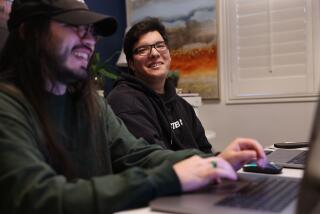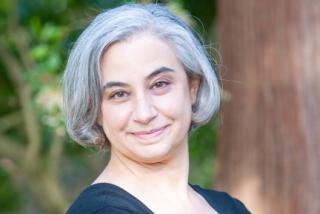A Family at Last : Couple With Disabilities Take In a Child With ‘Special Needs’
- Share via
Today, in Department 60 of Orange County Superior Court, Bruce, Renee and Jeff will become a family. There were times when they never thought it would happen.
Jeff, who will be 8 years old next week, has spent half his life in foster care. He has been considered a “special needs” child and difficult to adopt.
Bruce Boyd, 32, a PBX operator for the Disneyland Hotel, and his wife, Renee Boyd, 33, a high school special education teacher at La Mirada High School, said they were rejected as potential parents by the Orange County Department of Adoption because of their disabilities.
Bruce Boyd was born with mild cerebral palsy and Renee Boyd has a rare, progressive neuro-muscular disease.
A New Branch of AASK
But 10 months ago, Jeff was placed with the La Palma couple with the help of a new, local branch of a national organization, Aid for Adoption of Special Kids or AASK, a state-licensed agency specializing in placing difficult-to-adopt children, and attorney Randall Hicks of Orange, who donated his time.
Superior Court Judge Robert J. Polis is expected to make the legal arrangement final today.
“For two people who thought we’d never be able to have kids, it’s really something. You have no idea how exciting it is,” Bruce Boyd said.
The couple met in the Key Club, a Kiwanis Club affiliate which helps disadvantaged children go to camp. At the time, he was attending Fullerton Community College and she was at Cal State Fullerton. They have been married 10 years.
“We’ve always wanted to be parents. It’s what I expected all along,” Bruce Boyd said.
But because Renee Boyd can’t lift anything over five pounds and because bearing a child also would place too great a physical strain on her, she said she is unable to have a child. So three years ago, the couple applied at the county agency.
“They said: ‘You folks are handicapped. We have so many normal people we’re dealing with, we don’t have the time to match your special circumstances with the special circumstances of a child.’ They politely told us goodby,” Bruce Boyd said.
“It was extremely sad,” he said, adding that the couple did not socialize for six months afterwards. “We retreated. We thought maybe we were doing the wrong thing.”
Eventually, they decided to start looking again and called various private agencies. But they could not find any older children, a requirement since Renee would not be able to lift even an infant or a small child.
Then they discovered AASK, founded in 1973 by Robert and Dorothy DeBolt, a couple from Piedmont, Calif., who had adopted 14 handicapped children in addition to their six biological children from previous marriages. (The DeBolts have since moved to El Cajon in San Diego County.)
The private agency works with other adoption agencies to find homes for children who have been passed over. Usually, they are older or physically, emotionally or mentally handicapped, according to Linda Howard, executive director of the Southern California branch, located in Irvine.
“We try to get the message out: There are children waiting for adoption. You don’t have to be that elusive perfect family in order to adopt. You have to have a lot of love and a lot of ability to care for a child,” Howard said.
“There are many couples that would like to adopt but have the perception that there are no children available for adoption. Some have been rejected by an agency, some are discouraged by the statistics that there are 35 couples for every available infant,” said Hicks, the adoption attorney who helped the Boyds.
Some ‘Have It in Themselves’
“Most couples are not suited to raise a special-needs child,” Hicks said. “It’s tremendously hard.” But some, he said, “do have it in themselves.”
There are state funds available through the Adoptive Assistance Program to help parents pay for physical therapy or other expenses incurred by special-needs children, Hicks added.
So far, AASK has placed 4,000 children nationwide, Howard said. The agency charges no fee.
The agency located Jeffrey in San Diego County. The San Diego Department of Social Services approved the Boyds. “We were thrilled,” Bruce Boyd said.
Understanding that his new home would be permanent, Jeff began calling them “Mom and Dad” the day he moved in, the couple said.
Bruce Boyd said they told the boy that he would need to adjust to their limitations--in particular that neither one could walk very fast. “He had to learn he can’t go off anywhere he wants. We won’t be able to find him,” the new father said.
Now, when he plays outside their apartment, Jeff returns every 15 minutes to say “I’m still here. Can I still play?” Bruce Boyd said. “If we tell him no, he comes inside, which is amazing. He knows there are things I am unable to do. It doesn’t bother him.”
After three months, they bought Jeff a two-wheel bicycle. Bruce, who needs three wheels on his bicycle, nevertheless taught him to ride by riding alongside and guiding the handlebars with one hand. “I had to tell him, ‘If you fall over, you’re liable to get hurt.’
“After two or three months, we were riding along, and I looked down and said, ‘He doesn’t need me. He’s got himself balanced.’ ”
When he arrived, Jeff had some learning problems and had been placed in special education classes, Renee Boyd said. Now, however, the youngster has been placed in a regular first-grade class in a public school and seems more calm and relaxed, the Boyds said.
The needs of special children diminish, Renee Boyd said, “once they know they are in a secure, safe environment that has commitment attached to it.”
Despite their disabilities, Bruce and Renee Boyd said they believe that they can provide Jeffrey with the most important things: a stable environment, love and attention. And they believe that he can do something for them, too.
“He’s made us a family,” Renee Boyd said. “I can’t even put that into words.”
More to Read
Sign up for Essential California
The most important California stories and recommendations in your inbox every morning.
You may occasionally receive promotional content from the Los Angeles Times.










